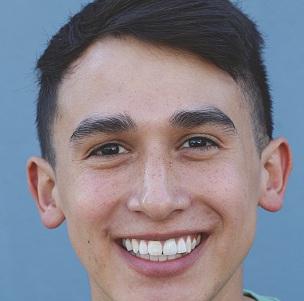
1 minute read
·Personal pronouns,p
SecciónD.Lospronombrespersonales
LearningOutcomes
You have already learned the phrase ¿y tú? Tú is what is known as a personal pronoun. The table below lists the personal pronouns in Spanish.
Lospronombrespersonales
I
you (talking to one person)
he/she
yo
tú
él/ella
we
nosotros/nosotras
you (plural – talking to a group of people) vosotros/vosotras they ellos/ellas
There are three ways to say ‘you’. (1) Tú is used to refer to only one person.
(2) Vosotros is used to refer to a group of males or a mixed male and female group.
(3) Vosotras is used to refer to a group of females only.
We, you (plural) and they can all be said in two different ways, depending on the gender of who the pronoun refers to.
(1) The –os ending (nosotros, vosotros, ellos) is used to refer to groups of males or mixed gender groups.
(2) The –as ending (nosotras, vosotras, ellas) is used to refer to females only.
1 2 3 4 5
D.2 Leeelblogycontestaalaspreguntasen Readtheblogandanswerthequestions inglés. inEnglish.
www.blogspot.ar/davidbuenosaires15
¡Hola blogueros! Me llamo David Sánchez Nadal. Soy argentino. Vivo en Buenos Aires, la capital de Argentina. Hablo italiano y español. Me gusta el rugby, el fútbol y el golf. También me gusta tocar el violín y ver la televisión. Mi programa favorito es Los Simpson. Mi color favorito es el rojo. En el futuro me gustaría ser profesor de geografía.

1. What country is David from? 2. In what city does he live? 3. What languages does he speak? 4. What sports does he play? 5. What musical instrument does he play? 6. What is his favourite television programme? 7. What is his favourite colour?
8. What would he like to be in the future?




